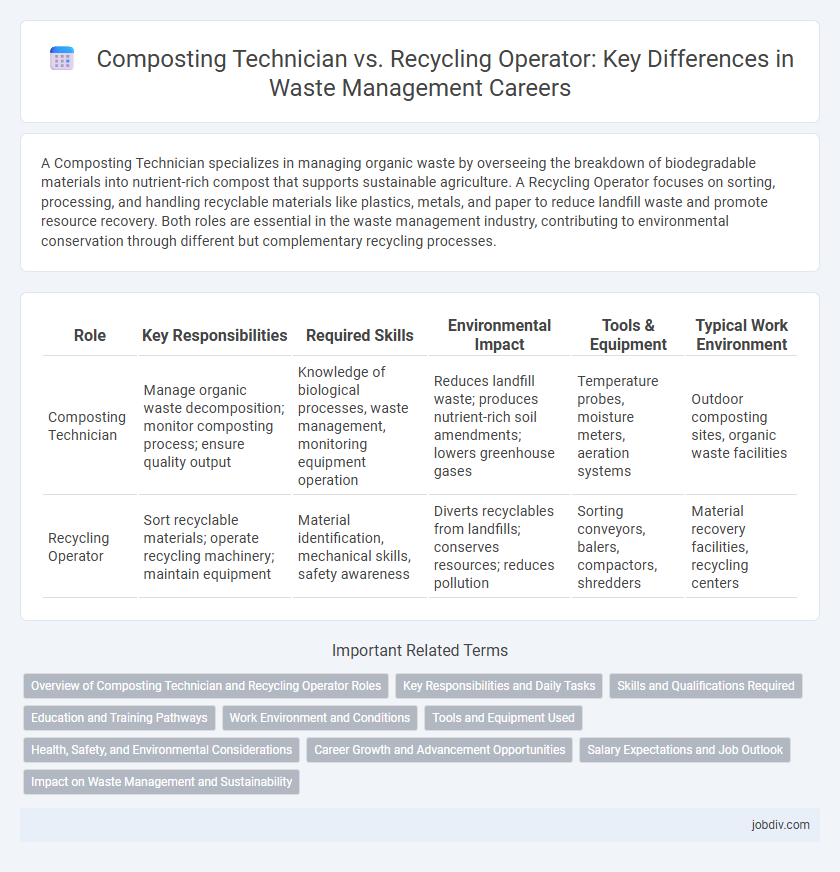A Composting Technician specializes in managing organic waste by overseeing the breakdown of biodegradable materials into nutrient-rich compost that supports sustainable agriculture. A Recycling Operator focuses on sorting, processing, and handling recyclable materials like plastics, metals, and paper to reduce landfill waste and promote resource recovery. Both roles are essential in the waste management industry, contributing to environmental conservation through different but complementary recycling processes.
Table of Comparison
| Role | Key Responsibilities | Required Skills | Environmental Impact | Tools & Equipment | Typical Work Environment |
|---|---|---|---|---|---|
| Composting Technician | Manage organic waste decomposition; monitor composting process; ensure quality output | Knowledge of biological processes, waste management, monitoring equipment operation | Reduces landfill waste; produces nutrient-rich soil amendments; lowers greenhouse gases | Temperature probes, moisture meters, aeration systems | Outdoor composting sites, organic waste facilities |
| Recycling Operator | Sort recyclable materials; operate recycling machinery; maintain equipment | Material identification, mechanical skills, safety awareness | Diverts recyclables from landfills; conserves resources; reduces pollution | Sorting conveyors, balers, compactors, shredders | Material recovery facilities, recycling centers |
Overview of Composting Technician and Recycling Operator Roles
Composting Technicians manage organic waste by overseeing composting processes, ensuring proper decomposition and nutrient cycling to produce high-quality compost for agricultural and landscaping use. Recycling Operators handle the collection, sorting, and processing of recyclable materials such as plastics, metals, and paper, aiming to reduce landfill waste and promote material reuse. Both roles require knowledge of waste management protocols and contribute significantly to sustainable environmental practices through waste diversion.
Key Responsibilities and Daily Tasks
A Composting Technician manages organic waste by monitoring composting processes, ensuring optimal conditions for decomposition, and operating specialized equipment to convert biodegradables into nutrient-rich compost. In contrast, a Recycling Operator sorts, processes, and prepares recyclable materials like plastics, metals, and paper for further manufacturing, utilizing conveyor belts, compactors, and balers. Both roles require adherence to environmental regulations and safety protocols but differ in the type of waste handled and processing techniques applied.
Skills and Qualifications Required
Composting technicians require expertise in organic waste management, microbiology, and soil science, along with skills in operating specialized composting equipment and monitoring decomposition processes. Recycling operators must possess knowledge of material sorting, machinery operation, and waste stream identification, complemented by physical stamina and safety protocol adherence. Both roles benefit from certifications in environmental health and safety, but composting technicians often need advanced understanding of biological systems, while recycling operators focus more on mechanical proficiency and logistics.
Education and Training Pathways
Composting technicians typically require specialized training in organic waste management, soil science, and microbiology, often obtained through vocational programs or certifications in composting technology. Recycling operators generally receive education focused on the sorting, processing, and handling of recyclable materials, which can be acquired through on-the-job training or formal courses in environmental science or waste management. Both roles emphasize practical skills and safety protocols, but composting technicians often pursue additional knowledge in ecological systems and sustainable agriculture.
Work Environment and Conditions
Composting Technicians typically work outdoors in organic waste facilities where they manage the decomposition process under varying weather conditions, often handling heavy equipment and monitoring temperature and moisture levels. Recycling Operators usually perform duties in recycling centers or material recovery facilities, exposed to loud machinery noise and repetitive sorting tasks, requiring protective gear to handle mixed recyclables. Both roles demand physical stamina and adherence to safety protocols to minimize exposure to odors, dust, and potential contaminants.
Tools and Equipment Used
Composting Technicians primarily use aerators, shredders, and moisture meters to manage organic waste decomposition and optimize compost quality. Recycling Operators rely on conveyor belts, balers, and sorting machines to efficiently separate and process recyclable materials. Both roles require specialized protective gear and machinery tailored to their specific waste management processes.
Health, Safety, and Environmental Considerations
Composting Technicians manage organic waste decomposition, emphasizing microbial safety and controlling pathogens through proper aeration and temperature regulation to prevent biohazards. Recycling Operators handle diverse recyclable materials, requiring careful sorting and machinery operation to minimize exposure to sharp objects, dust, and hazardous chemicals. Both roles prioritize environmental sustainability by reducing landfill waste and mitigating pollution risks, yet they differ in specific health protocols and safety measures tailored to organic versus inorganic waste processing.
Career Growth and Advancement Opportunities
Composting Technicians experience career growth through specialized knowledge in organic waste management, leading to roles such as Compost Facility Supervisor or Environmental Consultant. Recycling Operators advance by developing expertise in materials recovery and sorting technologies, opening pathways to positions like Recycling Coordinator or Waste Management Analyst. Both careers offer advancement opportunities tied to sustainability initiatives and regulatory compliance within the waste management sector.
Salary Expectations and Job Outlook
Composting Technicians typically earn an average salary ranging from $35,000 to $50,000 annually, with job growth driven by increasing demand for organic waste management and sustainable agricultural practices. Recycling Operators usually have a salary range of $30,000 to $45,000, supported by rising municipal recycling programs and environmental regulations aimed at reducing landfill use. Employment opportunities for both roles are expected to grow as the waste management industry expands its focus on resource recovery and circular economy initiatives.
Impact on Waste Management and Sustainability
Composting technicians enhance waste management by converting organic waste into nutrient-rich compost, reducing landfill use and greenhouse gas emissions while promoting soil health. Recycling operators focus on sorting and processing materials like plastics, metals, and paper, preventing resource depletion and lowering the environmental footprint of raw material extraction. Both roles contribute significantly to sustainability by enabling circular economy practices and reducing overall waste volume.
Composting Technician vs Recycling Operator Infographic

 jobdiv.com
jobdiv.com